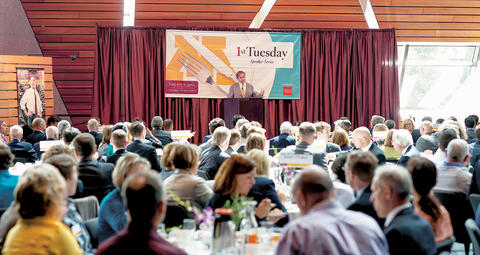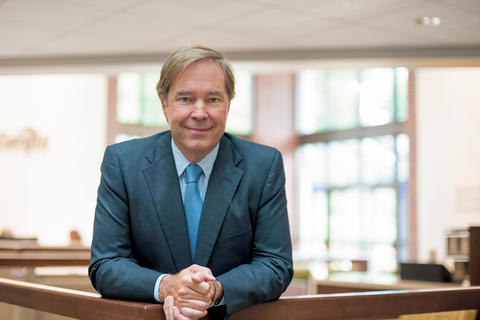
A Conversation with Cargill's David MacLennan
Monday, November 7, 2016
In May, the 1st Tuesday Speaker Series welcomed Cargill Chairman and CEO David MacLennan as its featured guest. He joins a long line of food and agricultural company executives who have spoken at 1st Tuesday, including PepsiCo Chairman and CEO Indra Nooyi, Land O’Lakes President and CEO Chris Policinski, CHS President and CEO Carl Casale, and General Mills Chairman and CEO Ken Powell. MacLennan spoke about the future of food and the role to be played by companies like Cargill. We recently sat down with him to talk about his presentation, expand on his thoughts, and discuss how business schools can best prepare the future leaders of the food and agricultural industry.
You were the featured guest at the 1st Tuesday Speaker Series event in May. What enticed you to speak at this particular venue?
There are a couple of different reasons. First of all, Cargill and the University have a very strong and historic partnership. We recruit there and we’ve got a lot of alumni that work here, so there’s a natural connection between our two organizations. But equally important, perhaps more important, is the chance to get our message out. It’s a message about Cargill, but it’s a message about the world. It gave me a chance to talk about the relationship between food security, climate change, and sustainability. It was a chance for me to better explain our perspectives on those important issues.
Your 1st Tuesday presentation was “The Future of Food.” Out of all topics, why did you select this one to address?
We’re a food company and we are thinking about the future; I want others to think about the future. We have been a key player in the food industry for 151 years. We spend our time making ingredients and making food that is healthier, safer, and more nutritious for a world that’s going to be nine billion people by 2050. I want others to think about it.
I want Cargill and the industry to be more transparent to let people know where their food comes from and what the issues are that we’re going to be confronting in the next 10, 20, 50 years. It’s a very important topic and as the world’s population grows, it’s going to put more of a strain on the world’s resources—all kinds of resources for all kinds of activity—and I want Cargill to be a leader, to be a thought leader, to get in front of these messages. Speaking to the Carlson School's 1st Tuesday was one way to start that conversation.
If there was one takeaway from your presentation that you wanted the audience to have—and that you now would want our readers to know—what was it?
There’s no one-size-fits-all solution. Let’s talk first of all about the United States—it is very divided politically and perhaps you could argue divided socially in many aspects as well. Oftentimes people say, "Well, it’s black or it’s white or it’s red or it’s blue," and when it comes to food and agriculture and nutrition, it’s many different colors and there’s many different solutions.
One of the components I talked about in the speech was GMOs. There’s a view held that GMOs are not good for you; that they’re unhealthy. There’s no science to prove that, and, in fact, GMOs are a key component to sustainability. So, my key message would be there’s no one silver bullet or no one-size-fits-all when it comes to food, ag, and sustainability and to get people thinking about the issues from multiple angles.
Oftentimes people say, 'Well, it’s black or it’s white or it’s red or it’s blue,' and when it comes to food and agriculture and nutrition, it’s many different colors and there’s many different solutions.
What do you believe are some of the misconceptions about the agriculture business?
I don’t know that it’s limited to agriculture, but people assume that something big is bad, whether it be banks or food and agriculture companies. We’re in an environment, and have been for perhaps the last 10 years, that people assume big companies are doing bad things. We want people to know that Cargill is a big company that is doing good things.
Our mission is to be the global leader in nourishing people and to do it in a sustainable and responsible way. In terms of the public dialogue, there hasn’t been much focus on agriculture and food historically as there has been in the last several years. In the absence of information, sometimes the human mind goes to the negative side. Again, there’s an assumption that GMOs aren’t safe. In fact, they’re one of the reasons why the American farmer and the world’s farmers have been able to increase their production without using incrementally more land, water, pesticides, and herbicides.
How well is the Twin Cities positioned to be the world leader in agribusiness, the ‘Silicon Valley of Agriculture’?
I think we’re really well positioned to be the world leader in agribusiness. I mean, you think about the companies that have been here—Cargill has been here 151 years, General Mills is celebrating its 150th anniversary this year. Land O’Lakes has a 95-year history.
As companies, we’re at the heart of the agricultural economy, we’re right on the Mississippi River, one of the world’s most efficient transportation systems for agricultural products. We’re very well positioned not only because of our corporate presence but also our geographical location.
For companies like Cargill, what kind of talent will they be looking for to help make this happen?
We’re looking for people who are expansive thinkers— individuals who are thinking globally. They’re thinking about what would it be like to live in China, what are going to be the needs of the African continent in terms of food and food security and nutrition and what we as individuals can do to help that. We are looking for people that are expansive global thinkers and have a natural curiosity about the world around them.
Cargill is looking for people that are resilient; they recognize change happens all the time. There’s a phrase that I’m fond of using which is ‘the pace of change will never be slower than it is today...' and not everybody likes change. There’s plenty of people that like the comfort of a steady and well-defined career or life and that’s fine, too. But we’re looking for people that love change, that thrive on it and are looking for new and creative ways of doing things.
What are the characteristics of effective leaders in agribusiness in general and at Cargill in particular?
We have a leadership model and at the heart of it are three things—integrity, courage, and conviction. It’s true of agriculture but it is true of any company,
of any leader. We expect Cargill leaders, and they should expect of themselves, to have integrity and ethics in their decision making and in their interactions at all times. They should have courage—the courage to make difficult decisions, to move quickly to make difficult decisions and not to be afraid. I consciously avoid using the word fear, because fear has an emotional component to it which slows down decisions or causes people to react more defensively. Having the courage to confront difficult topics and to be a leader when others are standing silent is one of the ways I would define courage.
Finally, we expect our leaders to have conviction. Effective leaders need to have the courage of their conviction but the conviction to say "here’s where we’re going and here’s why I think it’s the right direction and here’s why I think you should follow me." Having that conviction is a necessary and inspirational component of leadership.
What new competencies will be required of these leaders in the near future?
Leaders need to be comfortable in their own skin. Authenticity is a good word for it. More and more the world is looking for leaders and companies and institutions they can trust. The competency to build and create and sustain trust will be incredibly important in the years ahead.
There’s such an inherent distrust in so many of our institutions, whether it be in government or in business or in NGOs, wherever it may be, but trust-building is possible through authenticity and transparency. People fill the void if they don’t have information, they assume that in the absence of information something bad must be happening. Companies and individuals need to be transparent and confident that what they disclose will create trust.
Sure, there’ll be mistakes along the way, but if the world knows who you are and that your intentions are good, the world will forgive the mistakes that happen invariably along the way. So authenticity, inspirational leadership, the ability to articulate a vision, and the ability to focus on what is the good in what you’re doing—how it makes the world a better place—will be required of all leaders.
What would you like to see business schools do more of in order to meet this future demand?
In addition to having business fundamentals, our leaders need strong communication skills. I’m often surprised by the lack of verbal and written communication skills that I see—not just recent graduates, but of people in business.
It’s easy to get caught up in very brief or efficient systems of communication—through social media, texting, putting out however many characters are limited on Twitter—but the ability to communicate a complicated concept, idea, direction in a way which people can understand is a skill that will never go away and should continue to be taught in business schools.
We also need business schools to focus on social impact. We need students who are not just focusing on the numbers and understanding the basics, but that are also focusing on the connection between societies, communities, and individuals relative to business decisions. It’s really “systems thinking.” The connectedness of a business organization to your employees, your communities, your customers, and to the environment is a skill that will be needed in the future.
We need students who are not just focusing on the numbers and understanding the basics, but that are also focusing on the connection between societies, communities, and individuals relative to business decisions.
If a business school graduate could marry his or her business acumen with one other area of expertise or skill in order to be successful in agribusiness, what would it be?
I’m always a big believer in a passion for learning. And that’s what I love about working for Cargill. I learn something new every day. We’re in 70 countries with 150,000 employees, the world of Cargill never sleeps, there’s always something happening.
I’ve also said that if you’re bored at Cargill then there’s a problem, because we’re growing, we’re in fascinating places, we’re in the business of putting food on the table and delivering food from places of surplus to places of need. I think they need a natural curiosity to come in and say, "How can I help my customer succeed, how can I make Cargill better, how can I help my colleagues succeed?" I’ve said to groups of young leaders, "Don’t ever lose the desire to learn and to be better. Don’t get caught in a rut."
I’ve been in business for 34 years and I still love to learn new things. Whenever I’m traveling for Cargill—I love to travel to new places and learn from the people in our plants and facilities—I’ll ask, "What are you doing? What inspires you to come into work each day? How can we be better?" So that would be my advice for a skill not necessarily limited to agribusiness but true of any individual of any company, in any industry—a passion for learning and personal growth will always serve you well.

